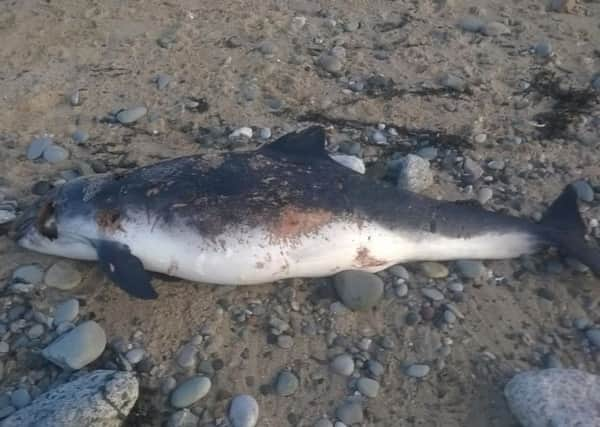Porpoise find is '˜proof of life'


The harbour porpoise, which looks like a dolphin but is actually a small whale, was found by passerby Gary Foley on the sand opposite Anchorsholme Lane and measured around four feet long.
Alan Wright, from the Lancashire Wildlife Trust, said: “It proves how much diversity and life we have in the Irish Sea. When something like this porpoise washes up, it’s sad but we get to see what’s in there.”
Advertisement
Hide AdAdvertisement
Hide AdThe washed-up porpoise, found on Tuesday afternoon, was probably swimming with a school of around 10 others, Mr Wright said.
“Unfortunately this looks like it has been hit by a boat,” he said.
“It could have been a shark but it was probably a boat.”
In July, sailor Simon Redfearn filmed a pod of 30 bottlenose dolphins in the sea off the coast of Blackpool, which the council said is proof the resort’s waters are cleaner than ever.
And Mr Wright said that, although the Irish Sea looks murky, the brown colour is actually life-sustaining mud.
Advertisement
Hide AdAdvertisement
Hide AdThe Wildlife Trust is planning to show just how vital it is for marine life in the coming months in a new campaign, he said.
Despite the porpoise’s sharp teeth, easily seen in Mr Foley’s snaps [above], an attack on humans would be extremely unlikely, Mr Wright added.
“They don’t tend to attack humans.
“They’re like dolphins, they put up with us or swim around us,” he said.
“They are beautiful animals.”
‘Sad’ porpoise death not linked to whales
The four-feet-long porpoise’s death is not being linked to the washing up of sperm whales across Europe, including three in Skegness, earlier this month.
Advertisement
Hide AdAdvertisement
Hide AdAt least 23 whales have been stranded on coastlines in recent weeks, and experts believe they may have come from the same pod.
However, they washed up on England’s east coast, as well as in Denmark, Germany, and the Netherlands, after swimming south through the North Sea.
That puts them on the opposite site of Britain to Cleveleys and Tuesday’s porpoise, which the Wildlife Trust said was probably hit by a boat.
It isn’t known exactly why the whales washed up, although one theory is they were forced into shallow waters in a hunt for food.
Advertisement
Hide AdAdvertisement
Hide AdSome of the whales, including three that beached in Lincolnshire, were later taken to landfill sites for disposal.
Alan Wright from the Lancashire Wildlife Trust said he would have liked to see them put back in the sea to sustain other marine life.
Report such beachings by calling 078006520333.